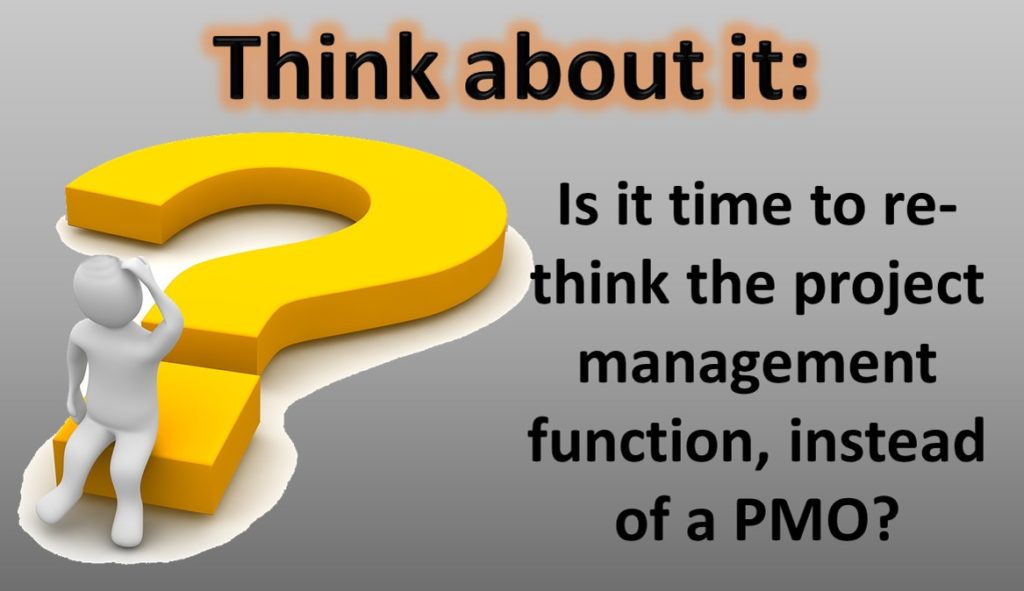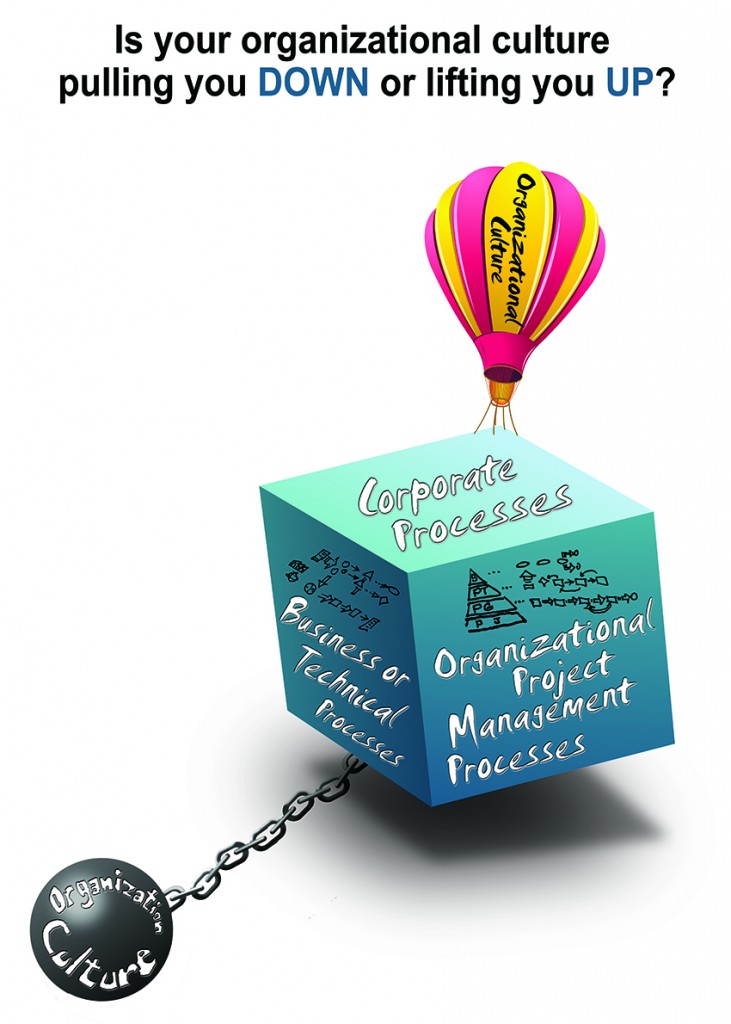Is it time to rethink the project management function? What triggered this discussion, is a recent post on rethinking the PMO. I know I have written on this topic before, but many articles on social media keep popping up, which encouraged me to write again. Today, we will make the case to rethink the project management function. We advocate moving from PMO to OPM, organizational project management.
First, we will start with some definitions to ensure alignments.
Project Management Definitions
First, we need to define what is a PMO. We know some refer to PMO as a project management office, others refer to it as a program management office. We have even seen this term used to mean project management officer. And the list goes on.
Rethinking the PMO?
It is a common knowledge in the project management community that PMOs usually do not last long. It is common that they fail within 2 to 3 years from their establishment. Consequently, we have seen a new trend in regard to PMO. We are starting to read about alternative PMO, Agile PMO, next-generation PMO, national PMO, even vision realization office or VRO. Therefore, we are seeing many posts and articles about “rethinking the PMO.”
New Concepts or Re-Packaging
Here we must ask are we seeing new concepts for Organizational Project Management or just repackaging of all terms? Another way of looking at this, is to question whether these new trends are the answer to the challenges faced by organizations in managing projects or just Band-Aids to make things look nice?
The three letters
When I read some of those PMO articles and posts, they remind me of the joke about the three letters. Here is the joke:
An outgoing CEO gave his successor three letters and told him the following. “When things go bad opened the first letter, later open the second letter and ultimately open the third one.”
Sure enough, things went bad so the new CEO open the first letter and read “organize a meeting and blame your predecessor.” So the new CEO did exactly that and things improved. After a while, things went bad again and it was time for the second letter. The second letter suggested to the new CEO to call for another meeting and propose re-organization plan. Everybody was happy until the next crisis and it was time again for the third letter. The third and last letter had one sentence on it, “write three letters.”
PMO Failure
Back to the PMO, is this what’s happening in the project management community? The PMO fail we blame the previous director or manager. The new PMO fails again reorganize. And here we go again one more time the PMO fails and maybe shut it down. And this cycle might repeat every few years.
Further, another recent trend is blaming the methodology. Waterfall or traditional project management doesn’t work we need agile, we need a scrum, we need a hybrid, and so on. What we think is the following: is it time to rethink the project management function in organizations? Do we need to stop playing with failed concepts and using band-aids where a more drastic solution is needed?
Rethinking the Project Management Function
 What do I mean by the term project management function?
What do I mean by the term project management function?
Maybe to make things easy let’s think of HR function, marketing function, finance function, IT function, and all the other functions that exist in an organization. Why are these areas of work, formal organizational functions, and are usually managed through departments or divisions but project management is not?
- Why we have an HR department but not a project management department?
- Is having an IT department more important than a project management department although most of the IT work is done through projects?
- Why do we have marketing department but we don’t see a need for a project management department?
The answer is clear:
Organizations have not seen the value of project management or accepted that project management as an independent domain and vital to organizational success. Maybe too many PMO failures have clouded their judgment and led to think that PM is just waste or overhead. They see project management as a commonsense business, which is okay for a commonsense project that is simple and quite small. What they often do not understand that it is not common sense to depend on common sense to manage none common sense projects. Project management has proven its strategic value and is not limited to basic projects. Whether we want to manage small simple projects or large and complex projects we need a formal approach to managing projects. Organizations need a methodological approach that is systematic and sustainable for managing all type of projects.
Closing Comments: Organizational Project Management
We agree that we need to consider rethinking the PMO, but why stop with band-aids? This is why we think it is time to rethink the project management functions. We need to have the right organizational culture that helps raise performance to new levels instead of holding us down. Organizations should build the capabilities and capacities for managing projects to be agent and catalyst for organizational success. If the organization deliver value through projects then we cannot understand why they wouldn’t have a project management department in a similar fashion to marketing or HR.
Once again, if you deliver value through projects then you must have a formal project management function. A project management function would be manifested in a department or division. That doesn’t mean this department will manage all organizational projects. A PM Department would have to set the policies, guidelines, procedures, governance structure, and the full Organizational Project Management system. An OPM that would be tailored approaches and include tailored methodologies.
Looking forward to reading your comments.
Consider subscribing, if you are not and join the community (refer to the menu – right side buttons).


We’ve all been there. I remember facilitating a training course in project controls to a large organisation involved in a multi-billion dollar infrastructure project. People from project controls insisted they were not part of PMO and that the PMO was not to interfere with their function. They were so focused on defining mandates (read: who to blame when things go wrong) and political sheet-pulling that they forgot what they were there for, to support the project. In the meantime their PMC was submitting so called ‘Earned Value reports’ on spreadsheets measuring progress with actual cost versus budget.
This begs the question: If everybody in the organisation would understand OPM and apply its principles, would we still need a PMO?
We think if the organization has adopted the culture of project management, AND, they have built the project management function via a department or division, THEN, there is no need for the PMO.
However, various department could still have a small project management unit to house their project managers and handle their projects, if they need dedicated staff.
I am trying to understand the practical and real difference between a Project management office and a Project management department. Would they not do/deliver the same service?
Hi Camilla
In theory, they COULD have similar roles. However, in practice it is totally different.
Often a PMO is mostly providing some support or template but no real power. Even when the PMO have a bit more power we will argue that not enough to help CREATE a project management mindset in organizations.
Creating the right mindset must start by ensuring Executive Management understand the value of project management and they cannot sustain good PM by depending on accidental project managers. That mindset start by recognizing project management is a function, that deserve it is own formal structure like HR, Marketing, or IT.
Maybe it is semantics, but without that, the mindset remains that a PMO is an overhead and could be cancelled anytime.
Further, the PM Department, will have the responsibility to build the organizational project management system, it will have the power to enforce it (like finance enforce financial control), and it will lead critical or strategic projects.
Regards
Einstein once said that we can’t solve a problem with the same thinking that created it. Learning is the avenue by which we allow new ways of thinking to guide us.
Generally, a learning culture (as opposed to a blame culture) is indispensable to organisations for success and ultimate survival.
Then how do we stimulate organisational learning? In operations we can learn by repetition, like learning from our mistakes (if we are allowed to!). But projects are once-offs, where we need to bring a-priori learning as transitional knowledge, and for the rest learn on the fly. This makes projects highly open to challenges and prone to failure.
In my opinion a PMO isolates the PM function in an organisation (see my previous comment to this blog) and everybody else washes their hands, as if it is not their concern. That’s why in many cases it ends up having the opposite effect to what is was meant to do, and ultimately gets abolished.
Mounir is right, we need PM thinking first, and that thinking needs to pervade the organisation at all levels. Strategy before structure.
I’d say instilling a culture of lessons learnt would be a good place to start. We are not good at this, and we need to give it the attention it deserves.
As a second point, we definitely need to make the growth of our people through learning an important performance indicator of all management positions.